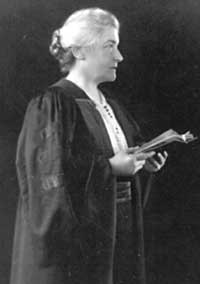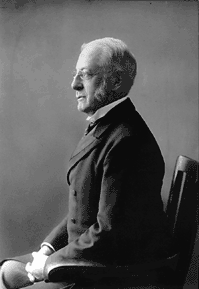Main Menu · Search · Current Issue · Contact · Archives · Centennial · Letters to the Editor · FAQs

[ Back to the main story ]
 M. Carey Thomas |
In 1899 Harvard president Charles William Eliot and Bryn Mawr president M. Carey Thomas attended the inauguration of the new president of Wellesley College, where Eliot gave the inaugural address and Thomas spoke at the president's luncheon.
Regarded as the most highly respected educational leader in the nation, the 65-year-old Eliot had transformed Harvard from a fine provincial college into a great university. Despite earlier hesitations about the suitability of higher education for women, at the time of his Wellesley speech Eliot was presiding over a Harvard that had made room for Radcliffe College and accepted its plans for expansion and development. He was about to appoint as its president Le Baron Russell Briggs, dean of the Faculty of Arts and Sciences, who would greatly assist Radcliffe as it became visible and respectable in the University. Eliot, oddly, used the Wellesley in-auguration to voice his doubts about offering the liberal arts to women.
"The so-called learned professions are very imperfectly open to women," he pointed out, "and the scientific professions are even less accessible; and society, as a whole, has not made up its mind in what intellectual fields women may be safely and profitably employed on a large scale." Although a man's college is clearly indispensable to society, he continued, those for women are still regarded as "luxuries or superfluities which some rather peculiar well-to-do girls desire to avail themselves of" or as a means of helping a "few exceptional girls" earn a living.
Women's colleges, therefore, should become schools of manners, Eliot averred, especially because women must rely on their "delicate qualities," rather than on their strength. He raised the possibility that, if they succeeded, women's institutions could lead the way in teaching men's colleges how to foster the proper behavior of young people. Women's colleges should also encourage religion, especially that favored by Congregational worship, avoiding the "gregarious religious excitement so unwholesome for young women."
Most importantly, according to Eliot, women's colleges should cease to imitate colleges for men. They should stop all competitive enticements to learning such as "grades, frequent examinations, prizes, and competitive scholarships," since women work hard without such goads. Then he stuck the knife home. Women's colleges should concentrate on an education that will not injure women's "bodily powers and functions." Eliot continued, "It remains to demonstrate what are the most appropriate, pleasing, and profitable studies for women, both from the point of view of the individual and the point of view of society; and this demonstration must be entirely freed from the influence of comparisons with the intellectual capacities and tastes of men. It would be a wonder, indeed, if the intellectual capacities of women were not at least as unlike those of men as their bodily capacities are."
 Charles William Eliot |
Sitting in her academic robes as part of the ceremonial delegation, Thomas listened to Eliot's speech with mounting fury. Later she wrote to a friend, "Eliot disgraced himself. He said the traditions of past learning and scholarship were of no use to women's education, that women's words were as unlike men's as their bodies, that women's colleges ought to be schools of manners and really was hateful."
In 1899, at age 42, Thomas had been president of Bryn Mawr College for five years. The first woman to earn a Ph.D. summa cum laude from the University of Zurich, she had spent her life trying to demonstrate that women's capacity of mind was equal to that of men and that women had a right to a man's education.
Thomas used the chapel talk that traditionally opened Bryn Mawr's college year to reply to Eliot. She began by accepting Eliot's statement that it was the mission of a college to teach manners: Bryn Mawr was to become a school of "good breeding....Manners do, as President Eliot says, matter immensely...."
Having established this, she went on to her central point. She attacked Eliot's premise that the world of knowledge "existing from the time of the Egyptians to the present existed only for men," and that therefore the curriculum and methods of men's colleges were no guide for women. This was, Thomas retorted, nonsense. "He might as well have told the president of Wellesley to invent a new Christian religion for Wellesley or new symphonies and operas, a new Beethoven and Wagner, new statues and pictures, a new Phidias and a new Titian, new tennis, new golf...in short, a new intellectual heavens and earth."
Thomas firmly believed women should take no separate courses, such as psychology or domestic science, to prepare them for life's tasks, nor should existing subjects be presented from a woman's point of view. Women's education must be identical to that of men. The life of the mind had no sex. As she later put it, "Science and literature and philology are what they are and inalterable." Although science and culture belong to women, they have been robbed of opportunity. "The life of the intellect and spirit has been lived only by men. The world of scholarship and research has been a man's world." Her task was to change that.
As women enter professions, the education they receive must be the same as men's. "Given two bridge-builders, a man and a woman, given a certain bridge to be built, and given as always the unchangeable laws of mechanics...it is simply inconceivable that the preliminary instruction given to the two bridge-builders should differ in quantity, quality, or method of presentation because while the bridge is building one will wear knickerbockers and the other a rainy-day skirt." The career paths of women and men must be identical. Because the world of knowledge is the same for both sexes, "the objects of competition are one and the same for both men and women--instructorships and professors' chairs, scholarly fame, and power to advance, however little, the outposts of knowledge."
In 1899, as Thomas confronted Eliot, she feared that acknowledgement of any difference between men and women and any accommodation of that difference in curriculum could threaten women's chances. She shared with her age--and with Eliot--a positivist belief in science. She believed that an education based on experimental methods could find the true patterns underlying language, build sound bridges, and cure typhoid fever. This education was to be open on equal terms to women and men.
Both Radcliffe and Bryn Mawr Colleges were determined to offer women the highest education available in 1899. Whatever doubts Eliot may have had, his actions were moving in a different direction. But his words and those of Thomas helped shape the ways that Americans understood the higher education of women at the turn of the century. When women stood at Harvard's gates and breached them more than a century ago, the words of Eliot and Thomas mattered a great deal.
The author of Alma Mater: Design and Experience in the Women's Colleges from Their Nineteenth-Century Beginnings to the 1930s and The Power and Passion of M. Carey Thomas, Helen Lefkowitz Horowitz, Ph.D. '69, teaches American studies and history at Smith College. This essay is drawn from a paper presented at the "Gender at the Gates" conference sponsored by Radcliffe's Schlesinger Library and Harvard's Warren Center for Studies in American History in November 1998.